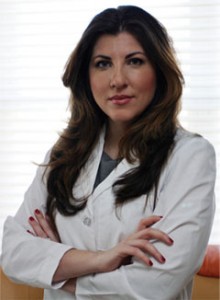Medical Treatment For Vaginal Yeast Infections (Candida infection)
Posted by admin on August 28th, 2013

“Most women will experience a yeast infection at some point in their life. Yeast infections are very common and are not a sexually transmitted disease. They can be easily treated. If you have symptoms of a vaginal yeast infection and aren’t sure about your symptoms, come in and see me.”
-Dr. Bella Zimilevich, MD
What is a vaginal yeast infection?
Vaginal yeast infections cause irritation of the vagina and vulva (the tissue surrounding the vagina). It is a very common infection- almost all women will experience at least one yeast infection in their life. For some women, yeast infections may occur more than once.
What causes vaginal yeast infections?
Yeast infections are caused by an overgrowth of Candida albicans. Candida is always present in the vagina, but sometimes an overgrowth of this yeast occurs, resulting in the symptoms of yeast infection. Overgowth can occur when the pH of the vagina is altered. Many factors can influence the internal conditions of the vagina, including:
- hormonal changes– some women may experience a yeast infection around the time of their period due to hormonal changes; pregnancy also increases the risk of developing a yeast infection
- illness
- medications– steroids and birth control pill may increase your risk of infection; antibiotics are the worst offenders because they kill of the normal flora (healthy bacteria that reside in the vagina) that normally keep yeast in check
- altered immunity– conditions such as HIV and diabetes can make your body more prone to yeast infections
- lifestyle factors– stress, lack of sleep and a poor diet have all been implicated in yeast infections

What are the symptoms of a yeast infection?
Symptoms of a yeast infection may include:
- redness and swelling of the vagina and vulva
- soreness/itchiness of the affected area
- pain during intercourse or when urinating
- a rash in the vaginal area
- thick, white discharge the consistency of cottage cheese but without an odor
Symptoms can be mild or very severe. If your symptoms are very severe, you will be unlikely to be able to ignore them.
Do I need to see you if I think I have a yeast infection?
It depends. If you have never had a yeast infection before, you should come in and see me. Yeast infection symptoms can be similar to the symptoms of certain sexually transmitted infections. It is best to be sure you actually have a yeast infection.
If you have had a yeast infection before and you are in a monogamous sexual relationship (meaning that you are fairly certain that both you and your partner have not been with anyone else), you might try an over-the-counter remedy recommended by your pharmacist.
If you treat yourself and your symptoms do not improve or they reoccur, you need to come in and see me.
What can I expect when I come in to see you?
When you come in and see me, I’ll ask you about any health problems you might have. I will also ask about any allergies you have. I’ll ask when your symptoms started and whether you have had similar symptoms before (and if so, how were you treated?)
In order to make the correct diagnosis, I will need to examine you. You will be asked to change into a gown and provided with a sheet for comfort and modesty while I examine you. The entire procedure is over in minutes and is not painful; although it may be mildly uncomfortable if you are inflamed in the vaginal area. I’ll explain everything I am doing before I do it, and if you are feeling nervous, or if you have never been examined before, please feel free to ask questions or let me know. I’ll tell you what to expect every step of the way.
If I think you have a vaginal yeast infection, I may prescribe an antifungal cream or suppository. I may also prescribe an oral antifungal medication. What I prescribe will be dependent on whether this is your first yeast infection and your overall health.
If you have had frequent yeast infections, I may suggest treating your partner as well. Although a yeast infection is not a sexually transmitted disease, men can also get a yeast infection and it is possible that you and your partner may pass the infection back and forth to each other. In addition, I may do some testing to make sure that your immune system is functioning the way it should.
Can yeast infections be prevented?
There are several things that you can do to avoid a yeast infection. Yeast thrives in a warm and moist environment, so bearing that in mind:
- avoid douching (this may kill off the normal flora of your vagina, allowing yeast to overgrow)
- avoid tight clothing or underwear made of nylon or synthetic fibers that don’t “breathe”
- shower instead of bathe, and avoid hot tubs
- get out of your wet bathing suit as soon as possible
- avoid bubble baths and other scented products that come in contact with the vaginal area
If you think you have a yeast infection but aren’t sure, or you are experiencing frequent yeast infection, make an appointment to come in and see me. We’ll soon have you feeling back to normal.
Our Location

6301 Mill Lane, Brooklyn, NY 11234.
(718) 942-4600



